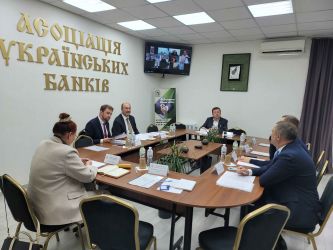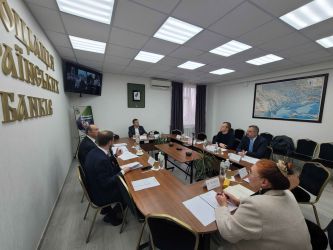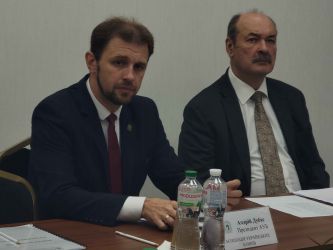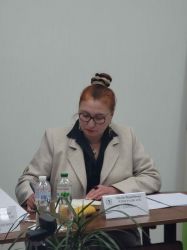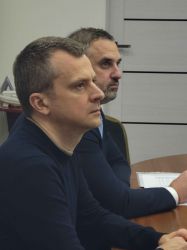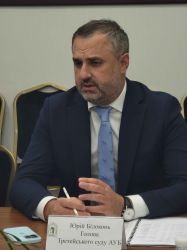AUB News
Meeting of the Council of the Association of Ukrainian Banks: new members, updates on the Arbitration Court, and strategic development initiatives
On October 7, the Association of Ukrainian Banks held a regular meeting of its Council, during which key issues related to the organization's development, strengthening its institutional capacity, and expanding cooperation with financial institutions were discussed.
The AUB community is growing — new financial companies have been accepted
The meeting was opened by Stanislav Arzhevitin, Chairman of the AUB Council, who noted the importance of joint action by the banking community in the face of economic challenges. He emphasized that the Council is the platform where the financial sector's common position is formed and priorities for cooperation with regulators, parliament, and international partners are determined.
In his speech, Andriy Dubas, President of the Association of Ukrainian Banks, informed the Council members about the current areas of work of the AUB. In particular, he noted the progress in the dialogue with international financial organizations. The goal is to expand access for medium and small banks to the resources of international programs. In addition, the President of the AUB spoke about the current cooperation with the Verkhovna Rada of Ukraine and the National Bank aimed at improving legislation in the field of financial services.
The Council unanimously approved the decision to admit three new companies to the Association: the investment company FinStream (K2000 LLC), Lemberg appraisal company (LEMBERG OK PE), and EXIM Leasing leasing company (EXIMLEASING LLC).
Serhiy Poznyak, founder of FinStream, emphasized that joining the AUB is an important step in the development of the veteran financial business, as joint participation in the Association opens up new opportunities for partnership, exchange of experience, and creation of joint initiatives for the development of small businesses.
The head of OK LEMBERG, Lyubomyr Derevenko, stressed that membership in the Association will allow for more effective work in the property valuation market, expand partnerships with banks, and integrate European asset valuation standards.
Andriy Fomin, Director of EXIM Leasing, noted that participation in the Association's activities will contribute to the development of the leasing market, improve customer service, and introduce modern financial instruments in cooperation with banks.
The Council members also considered the approval of the Association's updated Accounting Policy, which ensures consistency, transparency, and compliance with financial reporting standards. The document harmonizes internal accounting processes and will serve as a basis for effective interaction between the AUB and its partners, international donors, and regulatory authorities.
AUB Arbitration Court: renewal of membership – increased efficiency
During the meeting, special attention was paid to the work of the permanent Arbitration Court at the AUB, which plays an increasingly important role in resolving disputes between financial institutions and their clients. Court Chairman Yuriy Bilokon emphasized that arbitration within the Association is an effective and economically viable alternative to conventional court proceedings. He noted that banks and financial companies can include provisions in their contracts for the consideration of disputes specifically in the Arbitration Court at the AUB, which guarantees the efficiency, professionalism, and confidentiality of the proceedings.
Given the increased activity of the court and the growing number of banks and other financial institutions that include arbitration clauses in their contracts, the AUB Council decided to appoint three new judges to the court: Oleksandr Gryschenko, Oleksandr Moiseichenko, and Mykola Panchuk. All of them have higher legal education and significant experience in the financial sector, which will strengthen the expertise and trust in the decisions of the Arbitration Court.
During the consideration of candidates for the court, the Council members separately discussed the issue of the selection procedure for judges — from checking documents and experience to the possibility of introducing a compliance approach. It was decided to prepare proposals for improving the procedure and present them at the next Council meeting.
During the AUB Council meeting, Association President Andriy Dubas presented a brief operational report on the Association team's work over the past two months. In particular, he reported on a meeting with bank executives responsible for financial monitoring and an agreement to make such meetings regular. He also announced that on October 15, the AUB will hold a conference in conjunction with the French company ADELIE International Consulting, dedicated to transformation and innovation in banking payments. The conference will feature interviews with representatives of the National Bank of Ukraine and the government online services portal Diya.
Andriy Dubas also noted that on September 19–20, the Association of Ukrainian Banks held an off-site strategic session in the Lviv region with the participation of financial companies that are members of the AUB. The event was an important step in forming a common vision for the development of the financial sector and identifying new areas of cooperation.
He also announced that October will see the start of a new intake for the training program “Corporate Governance in Financial Institutions,” which is now in its third year and enjoys a high reputation and prestigious status among banks and non-bank financial institutions.
AUB projects: from idea to implementation
Mykhailo Medko, a member of the Board of the Association of Ukrainian Banks, told the meeting participants about the status of the project “Development of Cooperation in International Financial Organization (IFO) Programs,” which was previously discussed during the AUB strategic session for top bank managers. He noted that work on the initiative had reached its final stage: an updated rating model had been prepared to assess banks based on capital indicators and focus on lending to small and medium-sized businesses, and official appeals were being prepared to the Ukrainian offices of IFOs with the aim of initiating direct negotiations. The project aims to expand the participation of small and medium-sized banks in international development programs and attract additional financial resources to support business in the regions.
Nadiya Vorobyova, a member of the Board of the Association of Ukrainian Banks, informed the participants of the meeting about the status of the implementation of the “PEP Register” (PEP - politically exposed persons) project, which was previously discussed during the AUB strategic session for top managers of banks. She noted that work on the creation of a unified industry register of PEPs is ongoing: an analysis of open sources used by financial institutions has been conducted, as well as consultations with IT specialists on the technical implementation of an API for automated information collection. The project aims to improve the convenience and transparency of financial monitoring processes, as well as to unify banks' approaches to identifying politically exposed persons. Following the discussion, the Council members decided to create a working group of the AUB Council, which will develop practical proposals for a data exchange model and further stages of project implementation.
Serhii Mamedov, a member of the AUB Council and vice president of the Association, proposed to direct the work of the Ukrainian Banks Association Club, created this year, towards a permanent platform for discussions, communication, exchange of experience, and implementation of joint initiatives of the banking community. The Club has already become a platform for meaningful dialogue: in July, a meeting was held with the Minister of Agrarian Policy, and in September, with Viktor Yushchenko, President of Ukraine from 2005 to 2010. A new program of club events and a pool of speakers are currently being formed.
Summing up the meeting, Andriy Dubas thanked the participants for their constructive work and emphasized that the Association's activities today are aimed at strengthening self-regulation, building trust in the financial market, and creating an environment of professional cooperation that contributes to the stability of Ukraine's banking sector.
Subscribe to our newsletter

Contacts
15, Yevhena Sverstyuka str.,
Kyiv, 02002 Ukraine
Email :
office@aub.org.ua
Phones:
+380 (44) 516-8775

